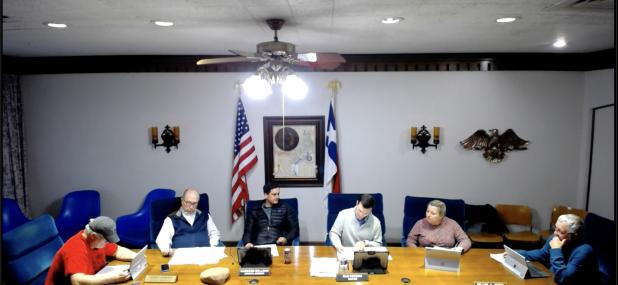
City oks zoning to bring retailer to Hwy 79 lots
The Olney City Council on Feb. 12 approved a zoning change to allow a retail business, possibly a grocery store, to be located on land owned by County Commissioner Stacey Rogers on State Highway 79 South.
“These lots are on a fourlane road so it’s visible coming into town and it’s really not residential any more the way the town has changed,” Mr. Rogers said. “I’ve spoken to a company for a Dollar General. To me it sounds crazy because we already have a Dollar General and a Family Dollar but they seem interested in coming to town and asked about the property.”
The Council approved the rezoning request from Residential to Business-3 on the recommendation of the Planning and Zoning Board, which met immediately before the City Council. Several residents who attended the meetings objected to the zoning change on the grounds that a third dollar store or other competing retailer would hurt existing local businesses.
“My concern is that I don’t think we have the population to support a lot of competition [to Stewart’s Food Store],” City Council candidate Mona Bernhardt told the zoning board. “I would love for Olney to get to the size where we could support two grocery stores.”
But the board said they had no say in whether to stop chain stores from coming to town to compete with local businesses.
“I think what our board looks at is, is it legal to do it and is it in the best interests of Olney,” board member Steve Slater said.
“I know you are saying it’s legal but we are concerned for the people that are already here,” Cemco president Carla Perry said. “I’m concerned about our local business.”
Stewart’s co-owner Robert Stewart said he wanted more information about “anything that is going to affect our business.”
“It may be about to happen so we’ll just be ready for it,” Mr. Stewart said.
Both the Council and the Planning and Zoning Board voted unanimously to approve the change. The lots now may be used for a wide range of retail, government offices, or residential applications under the B3 Central Business District designation , Mayor Rue Rogers said.
Board member Jim Strealey said he believed a chain store has “got to have a study, a survey, population analysis to get approval for a loan” before they would locate a store in Olney.
“There are several steps involved to develop something like this,” he said.
Dollar stores are an increasingly controversial subject in smaller towns across the U.S.
A 2023 report by the Washington DC-based non-profit, the Institute for Local Self-Reliance, said “dollar stores are not merely byproducts of economic distress; they are a cause of it.”
Through predatory tactics, the dollar chains are killing off grocery stores and other local businesses, leaving communities with fewer jobs, diminished access to basic goods, and dimmer prospects for overall well-being, the report said.
“In very small towns, dollar stores often locate next door to or across the street from the community’s only grocery store. … the objective is not to outcompete by winning over more customers, but rather to peel off just enough of the local store’s sales to send it into the red,” the report said. “At that point, it’s only a matter of time before it goes under, leaving residents with no nearby option for food shopping other than a dollar store.”
Mr. Rogers told the Planning and Zoning Board in December that the zoning change for the properties was part of a plan by Olney Economic Development Corporation (OECD) executive director Tom Parker to bring businesses to the City of Olney.
Mr. Parker said he had spoken with a property developer interested in placing a commercial building on the site for a Dollar General that would offer produce and meat as a competitor with Stewart’s Food Store. He said the building would not necessarily house another dollar store – Olney’s third – but could also house a hardware or feed store to directly compete with locally owned Olney Hardware and Berend Brothers feed store.
One of the OEDC’s new mandates is to promote local businesses with a portion of the sales taxes collected from those businesses. Another is to attract new businesses to town.
